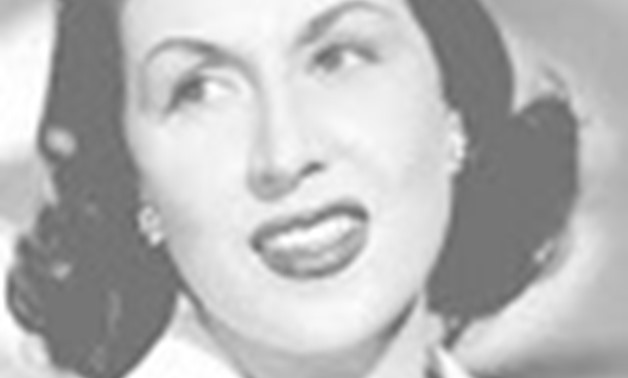
FILE - Legendary Leila Mourad
CAIRO - 18 February 2019: Leila Mourad was born on February 17, 1918 and passed away on November 21, 1995. Mourad was an Egyptian singer and actress and one of the most prominent superstars in the Arab world in her era.
Born Lillian Zaki Mourad Mordechai to a Jewish family in Al-Daher District in Cairo, she later changed her name to Leila Mourad. The late singer married three times and converted to Islam in 1947.
Mourad was born to Ibrahim Zaki Mourad Mordechai and Gamilah Salmon. Her father, an Egyptian Jew, was a respected singer, musician, and religious Jewish cantor (Hazzan). Her mother was a Jewish Egyptian of Polish origins. One of her brothers, Mounir Mourad, was an actor and composer.
The late legendary actress made her first stage appearance at 9 years old at Saalat Badi'a, one of Cairo's most successful music halls. The theatre had been founded in 1926 by actress and dancer Badi'a Masabni, who became Mourad's patron.
Her first film appearance, at 15, was in the 1932 “al-Dahaya” (The Victims) which had originally been made as a silent film. Her song, "The Day of Departure", was added as part of the transformation of the production into a sound film.
Mourad was trained by her father and Dawood Hosni, who was also Jewish. Hosni had composed the first Operetta in Arabic and he composed two songs for her: "Hairana Leh Bein El-Eloub" (Why can't you choose from among lovers), and "Howa el Dala'a Ya'ani Khessam" (Does dalliance mean avoiding me?).
Further success came when prominent Egyptian composer Mohammed Abdel Wahab heard her singing and gave her a role in his film “Yahia el Hob” (Viva Love!) in 1938. In the six years following the success of “Yahia el Hob” Mourad participated in five best-selling films with director Togo Mizrahi, becoming Egypt's top actress.
In 1945, she participated in “Layla Bint al-Fuqara” (Layla, daughter of the poor) directed by Anwar Wagdi whom she married shortly after. She went on to participate in 20 films, the most outstanding of which is “Ghazal al-Banat” (The Flirtation of Girls), directed by and co-starring Wagdi. It also featured Naguib al-Rihani and Abdel Wahab in their last appearances.
In 1953, she was selected, over Umm Kulthum, as the official singer of the Egyptian revolution. Shortly thereafter, a rumor that Mourad had visited Israel, where she had family, and donated money to its military raised suspicions of her spying for Israel and caused some Arab radio stations to boycott her. She denied these allegations and when called for judicial investigations, proved her innocence all along, declaring, "I am an Egyptian Muslim".
null
No proof was ever found that she had contributed money to Israel's military; the Egyptian government investigated and concluded that the charges against the singer were without foundation.
Some historians claim that Egyptian President Gamal Abdel Nasser insisted that Syria end their boycott of her songs and films.
Her decision to retire, aged 38, came with the failure of her last film ”Al Habib al Majhoul” (The Unknown Lover), the banning of her song, "With Unity, Order, and Work", praising the Free Officers 1952 revolution and the outbreak of the 1956 war.
Despite the immense popularity of her films, her singing career was overshadowed by Umm Kulthum who dominated Egypt's musical landscape and, in 1949, had become president of the Musicians' Union.
In the early 1950s, other singers also popular with younger audiences, such as Abdel al Halim Hafez, did not get the same exposure on the radio as Umm Kulthum.
The late legendary Mourad made a few brief reappearances during Ramadan in 1970, when she was scheduled to read Salah Jahin's "Fawazeer Ramadan" (Ramadan' puzzles), a daily traditional radio program held during the Holy month of Ramadan.
Leila Mourad died in a hospital in Cairo in 1995.
Comments
Leave a Comment